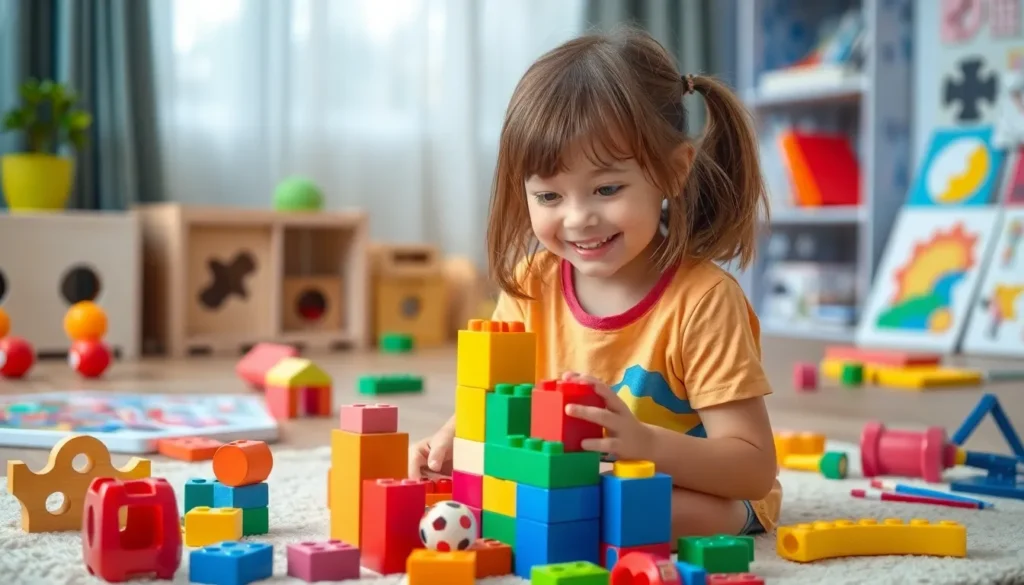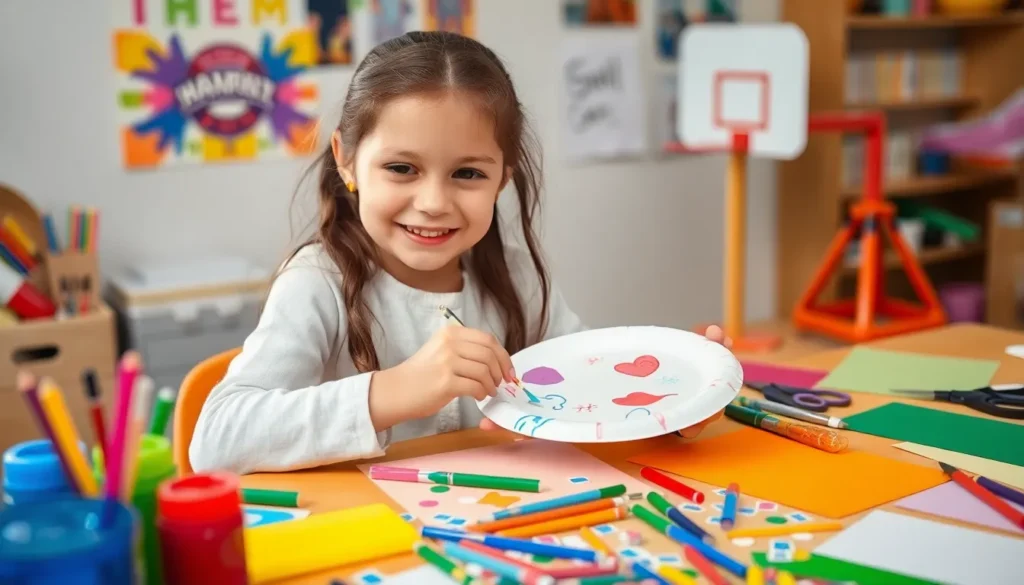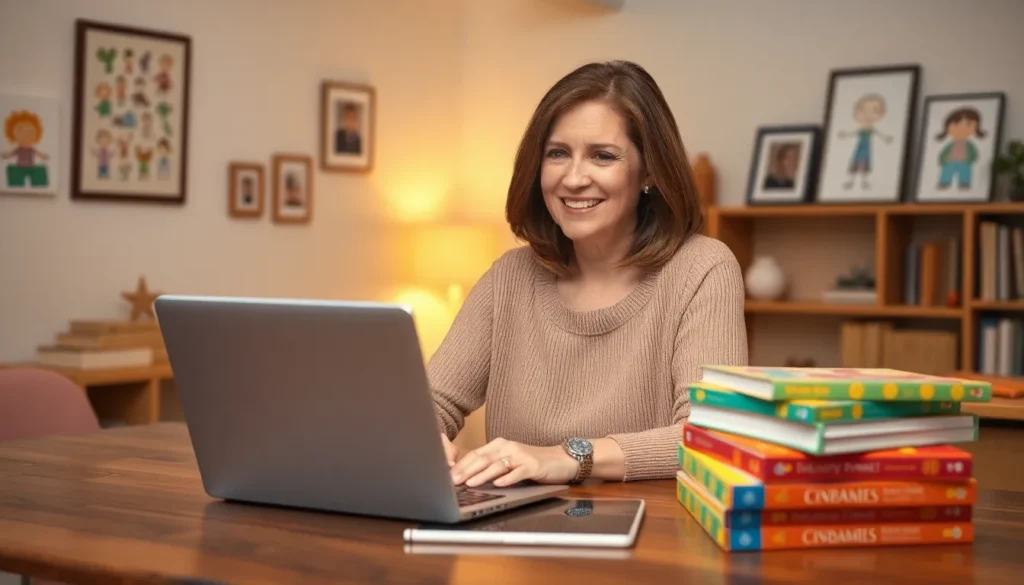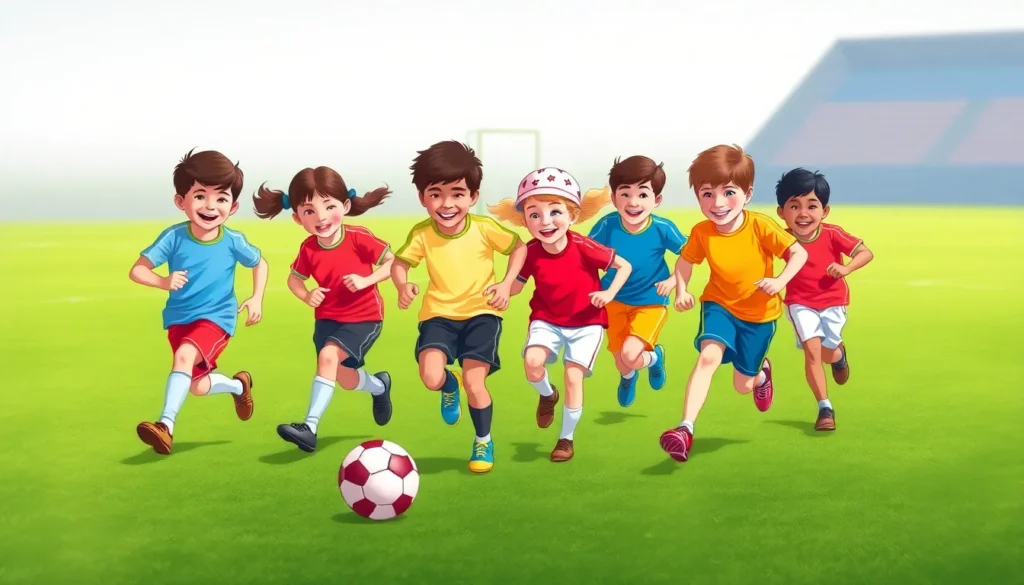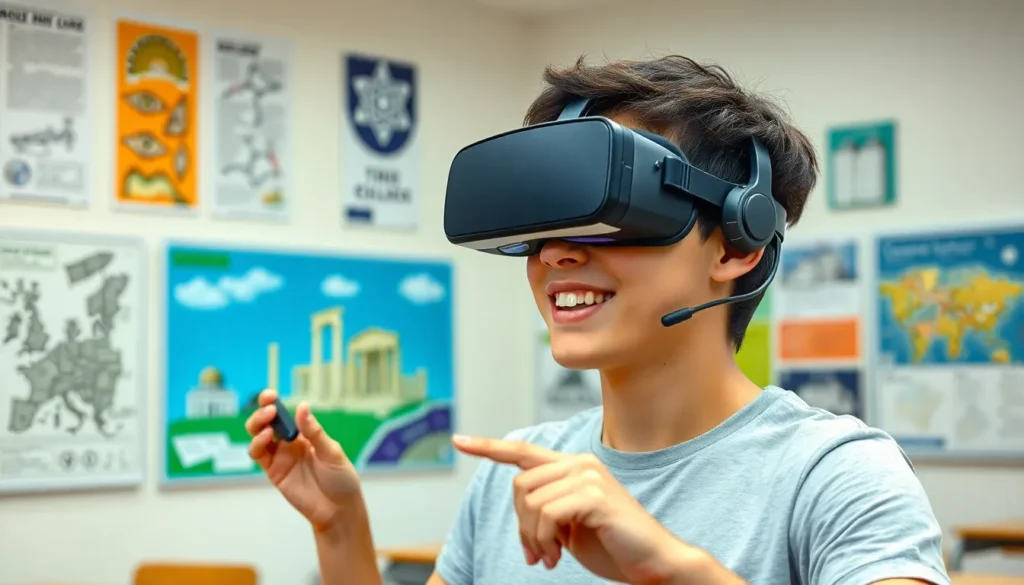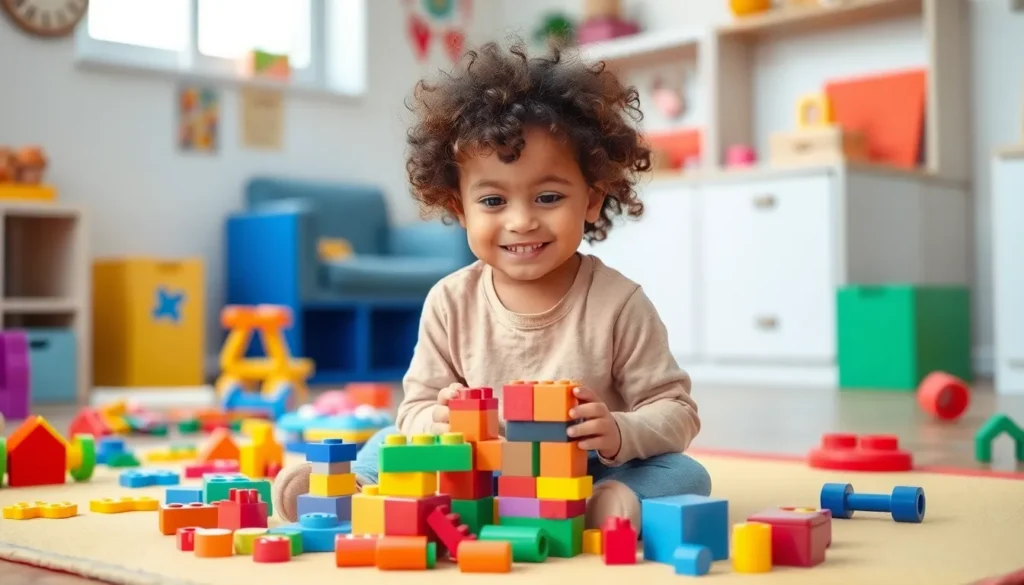When it comes to toddlers, the right toys can turn a living room into a classroom and a playdate into a learning extravaganza. Educational toys for kids aged 2 to 3 aren’t just fun—they’re the secret sauce to developing essential skills while keeping those tiny hands busy. Who knew that stacking blocks could lead to future engineering feats or that colorful puzzles could spark a lifelong love for problem-solving?
Table of Contents
ToggleImportance Of Educational Toys For Toddlers Age 2-3
Educational toys play a crucial role in the holistic development of toddlers aged 2 to 3. These toys transform play into meaningful learning experiences, fostering cognitive growth and creativity. Stacking blocks encourage problem-solving skills while enhancing fine motor abilities, making them essential tools for early development.
Toys designed for education stimulate critical thinking and imagination. Puzzles, for instance, introduce shape recognition and spatial awareness, essential skills for later math concepts. Engaging with these toys promotes social interaction when toddlers share or collaborate with peers, building important communication skills.
Furthermore, educational toys can help toddlers develop language proficiency. Products that incorporate letters, numbers, or simple words expose children to vocabulary essential for early literacy. When toddlers explore these concepts, they lay the groundwork for future learning milestones.
Interactive toys provoke curiosity and experimentation. Building sets inspire toddlers to create structures, nurturing engineering abilities. Additionally, musical toys enhance auditory skills and rhythm recognition, contributing to a well-rounded skill set.
Sensory toys add another layer of benefit. Textured, colorful objects engage the senses and support brain development. Parents seeking to boost learning experiences should prioritize toys that challenge toddlers while providing joy.
The integration of educational toys into playtime fosters essential skills for toddlers aged 2 to 3. These toys play a significant role in preparing children for academic success and personal growth.
Types Of Educational Toys
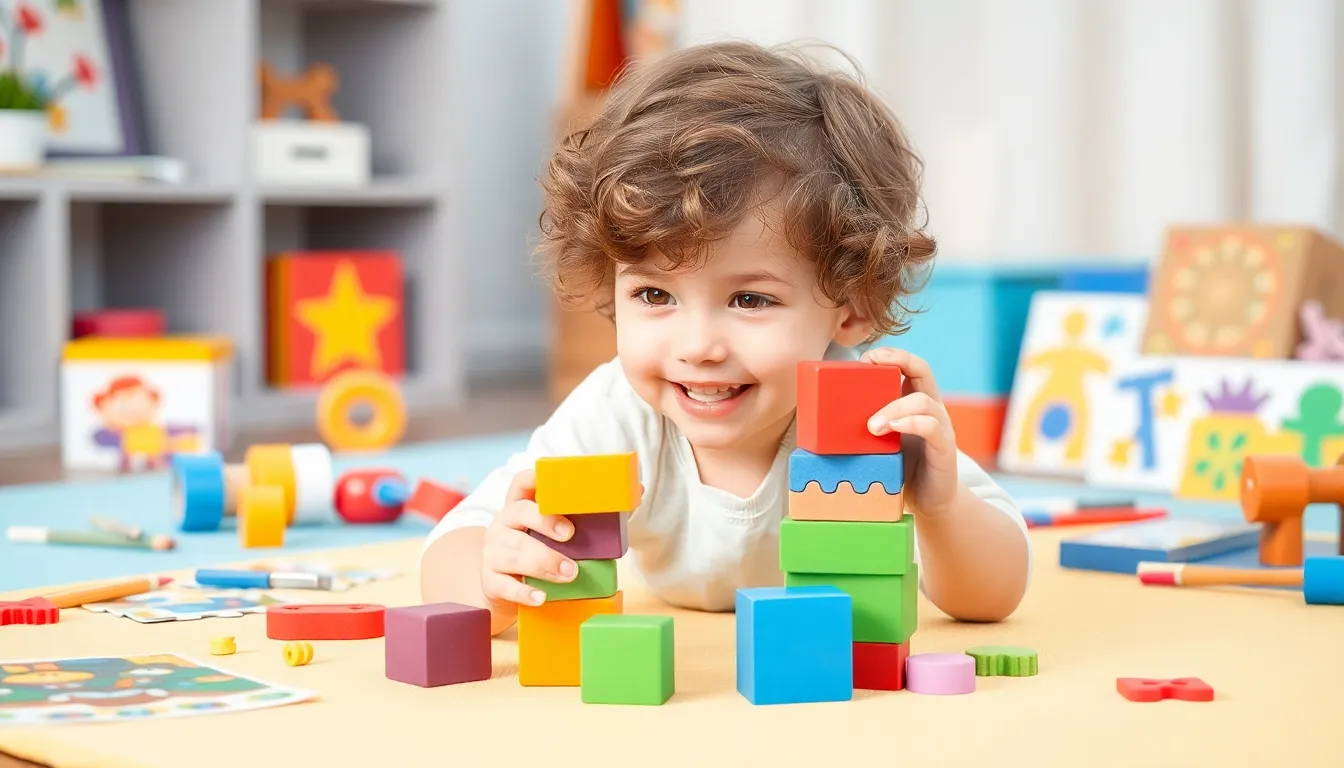
Educational toys come in various types, each designed to support different areas of a toddler’s development. Selecting the right toys enhances playtime and fosters essential skills in young children.
Cognitive Development Toys
Cognitive development toys stimulate critical thinking and problem-solving skills. Puzzles that feature shapes and numbers challenge toddlers, laying foundations for early math concepts. Games promoting memory, such as matching cards, enhance focus and cognitive flexibility. Flashcards introduce letters, numbers, and vocabulary, essential for literacy development. Building sets encourage creative thinking while enhancing spatial awareness. Each of these toys plays a vital role in fostering a child’s ability to think independently and explore their environment.
Motor Skills Development Toys
Motor skills development toys aid in refining fine and gross motor skills. Stacking blocks encourage toddlers to use their hands for precise movements, essential for developing dexterity. Push and pull toys promote larger movements, helping toddlers improve balance and coordination. Manipulative toys, like beads or animal figurines, challenge little fingers and improve hand-eye coordination. Activity tables combine various features, engaging young children in different ways while enhancing their physical abilities. The diversity of these toys ensures holistic growth in motor skills.
Creative Play Toys
Creative play toys inspire imagination and artistic expression. Art supplies, including non-toxic crayons and washable markers, encourage free expression without limits. Play-dough sets allow for tactile exploration while promoting creativity and sensory experiences. Dress-up costumes spark role-playing, which nurtures social and emotional development. Building blocks enable the construction of unique structures, merging creativity with engineering skills. These toys provide endless opportunities for imaginative play, crucial for overall childhood development.
Benefits Of Educational Toys
Educational toys offer numerous advantages for toddlers aged 2 to 3. These toys transform playtime into interactive learning experiences that shape essential skills.
Enhancing Learning Skills
Educational toys foster critical learning skills in toddlers. Puzzles promote problem-solving abilities and enhance cognitive function. Stacking blocks develop fine motor skills while also introducing basic engineering concepts. By engaging with number and letter toys, toddlers build a foundation for early literacy. Flashcards stimulate memory and recognition, allowing children to grasp important concepts early on. Each of these activities contributes to holistic growth, preparing toddlers for future academic challenges.
Encouraging Social Interaction
Social interaction thrives through educational toys. Group play encourages cooperation, sharing, and communication skills. Toddlers learn to express themselves while collaborating on tasks like building or solving puzzles together. Playing with peers fosters a sense of belonging, creating essential social connections. Engaging in role-play with dress-up costumes enhances imaginative play and empathy. Interactive play experiences reinforce language development, as children converse and negotiate with one another. These interactions lay the groundwork for emotional and social competence in later years.
How To Choose The Right Educational Toys
Choosing the right educational toys involves careful consideration of several key factors. Parents and caregivers can enhance learning outcomes by focusing on age-appropriate options and prioritizing safety and quality.
Consider Age Appropriateness
Selecting age-appropriate toys ensures toddlers engage meaningfully with learning experiences. Toys designed for 2-3 year olds often feature simple concepts, allowing children to grasp basic principles. For example, puzzles with larger pieces help develop critical thinking without frustrating young learners. Additionally, stacking blocks promote fine motor skills and spatial awareness. Knowledgeable caregivers seek toys that align with developmental milestones to support cognitive growth and imaginative play. Engaging toddlers with the right level of challenge fosters confidence while building essential skills.
Prioritize Safety And Quality
Safety and quality remain top priorities when choosing educational toys. Non-toxic materials are essential, as toddlers often explore toys orally. Durable construction prevents breakage, ensuring that toys withstand active play. Reputable brands frequently adhere to safety regulations, providing peace of mind to caregivers. High-quality toys often enhance longevity, making them suitable for multiple uses or hand-me-downs. It’s important to check for certifications and reviews before purchasing. Investing in safe and quality toys ultimately supports healthy development and enjoyable play experiences for toddlers.
Choosing the right educational toys for toddlers aged 2 to 3 is essential for fostering their development. These toys not only entertain but also build foundational skills that will benefit children in the long run. By prioritizing age-appropriate options that stimulate cognitive and motor skills, caregivers can create enriching play experiences.
Safety and quality should always be at the forefront when selecting toys. Non-toxic materials and durable construction ensure that toddlers can explore freely while learning. Engaging with educational toys paves the way for curiosity creativity and social interaction. Investing in these tools today sets the stage for a brighter future filled with learning and growth.


